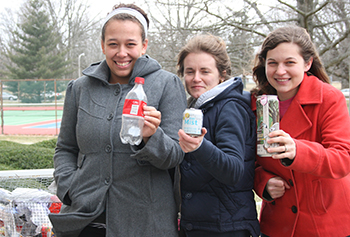
Sustainability Club: From left to right, Chelsea Mott, Psychology, South Bend, Ind.; Amber Slaughterbeck, Social Science History Concentration, New Goshen, Ind.; Emma Bird (President), Social Science History Concentration, West Terre Haute, Ind.
By Lisa Luper, Communications Intern
Emma Bird is passionate about trash. Or more accurately, as the president of Saint Mary-of-the-Woods’ Sustainability Club, she’s passionate about seeing less of it.
Along with the other members of the club, Bird, a social science history concentration major from West Terre Haute, Ind., encourages SMWC students to adopt sustainable habits. This semester, the club is involved in several projects both on campus and in the community.
One of their newest projects is a competition to reduce the amount of trash students throw away. The week of February 19, 2013, club members will count the bags of trash in the Le Fer residence hall to see which floor makes the least garbage. The floor that reduces their trash by the biggest percent will win a prize. Most of the trash, according to Bird, is water bottles.
According to Treehugger.com, “The US consumes 1500 plastic water bottles every second. Out of the 50 billion bottles of water being bought each year, 80 percent end up in a landfill, even though recycling programs exist.”
“It’s crazy how many water bottles people throw away,” Bird said. “Those are one of the easiest things to recycle. You don’t even have to wash them out first.”
The club is also promoting a grass-roots effort to go trayless in the dining hall. Bird explained that it helps students examine their attitudes about food.
“First, you get a tray, which you don’t really need,” Bird said. “You load it up with a couple of plates and maybe a bowl and fill them with food that you probably won’t eat. Without the convenience of a tray, you have to make deliberate choices about what to eat.”
She added that going trayless helps to improve students’ health by eating less, to eliminate wasteful food choices, and to save water by not soiling trays.
Additionally, the club is focused on other ways to improve the environment. Students earn Eco-Bucks when demonstrating sustainable behavior around campus. They are rewarded for making choices such as to walking instead of driving around campus. The club plans to allow students to exchange their Eco-Bucks for prizes.
The club’s concern for the environment is not limited to campus. For the past two years, the Sustainability Club has disposed of trash at the Wabashiki Fish and Wildlife preserve. The club’s third annual cleanup day is scheduled for April 7, 2013, from 9 a.m. to 1 p.m.